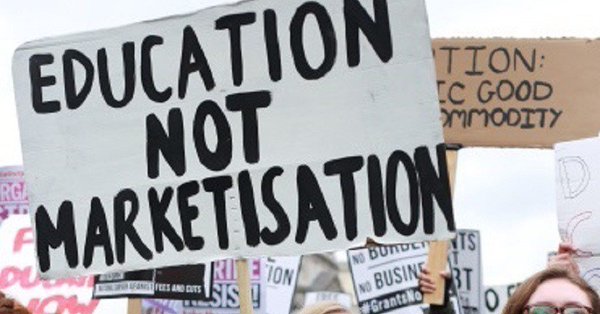Today, 20 February, marks the beginning of a 14 day strike by 50,000 university staff at 74 campuses in Britain. Many friends and authors of this website will be participating. Our thoughts and solidarity are with them.
Phil Leeke is a Faculty Member at the University of Liverpool, English Language Centre

As I write these words whole areas of the town where I grew up— Bridgnorth in Shropshire— seem to be under water. So do the streets in the town of Ironbridge. Home of the world’s first iron bridge. The landscapes of AE Houseman look more like an African delta than anything I can remember and oak trees and hedgerows poke out from waterlogged and flooded fields. Something seems very very wrong.
Indeed, I remember the Australian PM vigorously pumping the hands of people who had lost everything in the Australian bushfires and I wonder when Boris will come chortling along in a canoe and do the same. One eye on the perpetual camera. The English version will have tea towels and tea pots floating around in swirling waters. While some countries burn, we are clearly going to be inundated. “This is spiffing” Boris will say, as he floats away on a sodden mattress.
Things seem wrong because they are wrong. In the words of the American writer Don DeLillo and apropos Johnson and Morrison: substance has given way to aura.
Similarly, I am about to go on strike. Again. So are many other workers at British universities. The centre where I work has been under strategic review for over a year. The language is depressingly familiar. Strategy performance leadership enhancement. The words say one thing yet mean something else. I now have high blood pressure because of them and, according to the charts, am only a series of beeps away from a hypertensive crisis. Last night, I wore a machine which coiled its way around my arm like a snake and woke me up every twenty minutes to take my blood pressure. This, I’m sure, increased my blood pressure.
While we cannot exactly compare my own partial and limited existential crisis with the existential reality currently facing the planet, they are, I would argue, part of the warp and weft of the same problem. Valuing things in the wrong way and degrading them as a result. Years ago, when I was a PhD student at a well-known Russel Group University, I was encouraged to re-register every year through a portal that informed me my ‘academic shopping cart’ was empty. The language both coarsened and cheapened my ‘experience’. Had I perhaps forgotten the Foucault? Who was getting in the brewskies and where on earth was the Shakespeare?
Although parts of the conservative media will no doubt attempt to position us as cosy-arsed duffers only concerned with pension pots and having no experience of the tyranny of the ‘real’, the strike is about much more than pensions. When staff are looking forward to going on strike because a picket line is the only place where there is any community, there is something wrong. When people exist in states of either barely contained rage or chronic mild anxiety, there is something wrong. When student mental health is at an all time low and suicide an ever present reality, there is something deeply wrong.
I live in the city of Manchester and I work in Liverpool. Housing in Manchester is increasingly financialised. So is education. So is everything else. As one of the world’s first industrial cities, the early history of Manchester is a paradigmatic example of what happens when people don’t have any rights or representation. There is a heritage industry there now. The glossy marketing brochures for unaffordable apartments around the Angel Meadow area, first mentioned by Engels in his ‘The Condition of the Working Class in England’ make it clear that the area has a lot of ‘heritage’. They just don’t say what that heritage is. They odorise it. They don’t mention the mass pauper burial grounds or the fact that the ‘angels’ in the meadow were thought to be the souls of departed children. No, none of these things get a look in, and neither do the homeless people increasingly pushed into the very margins of the city. Neither does the obvious fact that these types of housing are clearly intent on reproducing much the same sort of reality that existed hundreds of years ago. Instead, they talk about ‘pretty’ city centre living. What (insert definite article plus expletive) is that? In this version of high-rise Ballardian reality, there are people who, if they can afford it, breathe the rarefied air of apartment living while never having to interact with the people outside the towers. You order in. Work out at the gym and play in the games room. The student housing industry shows something of the same values as does the rest of the university sector. It is often said that staff are fighting for the very soul of the university. This doesn’t seem to be mere hyperbole. Our union recently played a key role in helping many members of staff keep their jobs. I am a passionate believer in trade unionism. How could I not be? I live in Manchester. I read history. Anyone who cares to, can see what happens when everything is reduced to a brutal cash nexus and education is thought to be only about future market value.
Measles is increasing in England. There has been a mumps outbreak in universities. People in Australia are losing everything and I am just grateful that my parents old house in Bridgnorth is located in ‘high’ and not ‘low’ town. At university and under market pressure, we must all strive to offer advanced degrees in what the writer Gore Vidal called ‘conformity and consumerism.’ An educated and involved citizenry is clearly the last thing we need.
We feckless, irresponsible reprobates refuse all this, however.
And that’s why we’re going on strike.


Be the first to comment